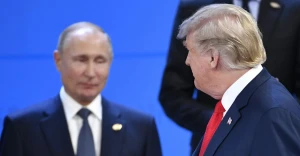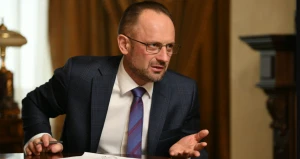
West is likely incapable of strong reaction to Russia blowing up ZNPP – Colonel Grant
Possible blowing up of the Zaporizhzhia NPP by Russian forces will shake the West, but there are doubts it will be capable of any exceptional reaction
Glen Grant, a retired British Army colonel and military expert, shared his opinions with Espreso TV.
"I am sure that the West has told Putin through its closed channels that this is a bad idea. I mean, the American government has made it clear that the use of a nuclear bomb would be considered an attack on NATO, because the consequences would inevitably affect NATO countries. It is therefore logical that the Russians would not want to do this. However, we should not forget that we are dealing with a not entirely logical animal, i.e. Putin, and it will always be possible that he will want to use anything to keep power in his hands," Grant said.
He said that before considering any Western response, it is crucial to bear in mind that this war is predominantly being fought to sway Russian public opinion.
"His actions directly depend on the public opinion of the Russians, with his hand constantly on the pulse of it. Is this opinion now in favor of blowing up the nuclear power plant? We do not know. But if he thinks that by taking this step, public opinion will give him the support he needs or make him stronger, he will do it... Among other things, we need to look inside Russia first to understand what it is talking about and how it thinks," the colonel added.
In his opinion, the blowing up of the nuclear power plant will definitely shake the West.
"But I doubt that people there will be capable of any exceptional reaction. They didn't do anything special after the Kakhovka hydroelectric power plant explosion. And it really doesn't make sense, because if the dam had been blown up in any other country in the world, even in China, Western countries would have rushed to help, provided the necessary equipment, search dogs, and everything else. They would have sent everything they could, as they always do in times of disaster, but in the case of Ukraine, they did nothing, and I'm afraid it could happen again," Grant concluded.
The situation at the Zaporizhzhia nuclear power plant
Russian forces occupied Zaporizhzhia NPP in late February 2022. Since then, there has been a constant presence of personnel and military equipment, which the invading Russian troops store in machine rooms and occasionally deploy to positions for shelling the territories of the Nikopol district in the Dnipropetrovsk region, located on the other side of the Kakhovka Reservoir.
The International Atomic Energy Agency (IAEA) has a monitoring mission at the station, which is supposed to ensure that the nuclear power plant is not used as a military base, that it is not attacked, and that no fire is initiated from the NPP. Power outages at the nuclear power plant occur regularly though. Occupiers began importing explosives to the Zaporizhzhia nuclear power plant last year.
In May 2023 information emerged that the Russian forces had placed explosives in the turbine room of the ZNPP’s fourth power unit. Additionally, the invading Russian forces have nearly completely destroyed the emergency readiness and response system at the nuclear power plant.
On June 22, the Director-General of the IAEA, after visiting ZNPP Grossi, stated that the situation at the plant is extremely unstable. On the same day, President Volodymyr Zelenskyy announced that intelligence had received information that Russia was considering a scenario for a terrorist act at the temporarily occupied Zaporizhzhia Nuclear Power Plant, which would cause a radiation release.
The Head of the Main Intelligence Directorate, Kyrylo Budanov, stated that Russia has completed preparations for a terrorist act at the Zaporizhzhia Nuclear Power Plant. Subsequently, large-scale exercises were held in four regions of Ukraine to prepare for a possible terrorist attack on the ZNPP.
On June 30, the Main Intelligence Directorate reported that the occupying Russian forces were gradually leaving the ZNPP, and that Ukrainian employees who had signed a contract with Rosatom also received evacuation recommendations. In addition, the plant's staff received an order to blame Ukraine in any emergency situation.
At night, on July 4, Zaporizhzhia NPP lost power from the main power line, and the plant was connected to the only available backup line. The Ukrainian Armed Forces officially reported that Russian troops were preparing a provocation at ZNPP: Russians placed suspicious devices similar to explosives on the roof of power units 3 and 4.
On July 5, during a meeting of the OSCE Forum for Security Co-operation, the European Union made a statement that Russia must immediately stop actions that threaten the safety of nuclear facilities and withdraw its troops from Ukraine.
At the same time, IAEA Director General Rafael Grossi said that the agency had not detected any signs of mining at ZNPP. According to him, despite this, experts are "extremely wary". Subsequently, satellite images from Planet Labs, taken on the morning of July 5, showed unknown objects on the roof of the fourth power unit of the Zaporizhzhia NPP. The General Staff had previously reported that this particular power unit had been mined.
The head of the Main Intelligence Directorate, Kyrylo Budanov, said on July 6 that the threat of a terrorist attack at the Zaporizhzhia NPP was decreasing. However, the president of Energoatom later said that about 700 Russians are currently at the Zaporizhzhia NPP. The plant is mined, and machine gun nests are placed on the roofs of the power units. Energoatom also reported that the occupiers allow specialists from the Russian Federation to work at Zaporizhzhia NPP who do not have the necessary knowledge and skills to operate the plant.
On July 6, the first deputy head of Putin's administration, Serhiy Kiriyenko, arrived on the territory of the occupied ZNPP. The visit took place amid the publication of information about the Russians' mining of the ZNPP.
On July 7, the United States in the OSCE called on Russia to immediately withdraw its troops from ZNPP and return it to Ukrainian control, as it was concerned about reports of Russia's mining of the plant and plans for a "false flag" operation.
Also on July 7, the IAEA reported that its mission was able to inspect several facilities at the Zaporizhzhia NPP, except for the roof, but found no signs of explosives.
- News












































